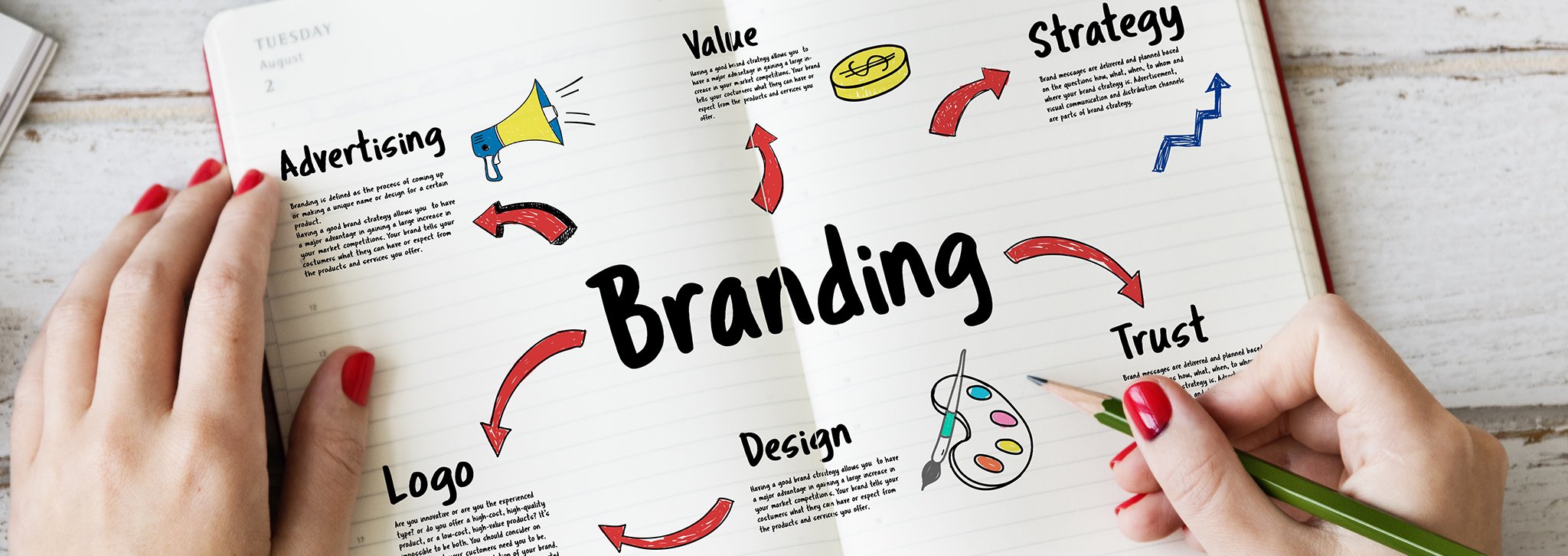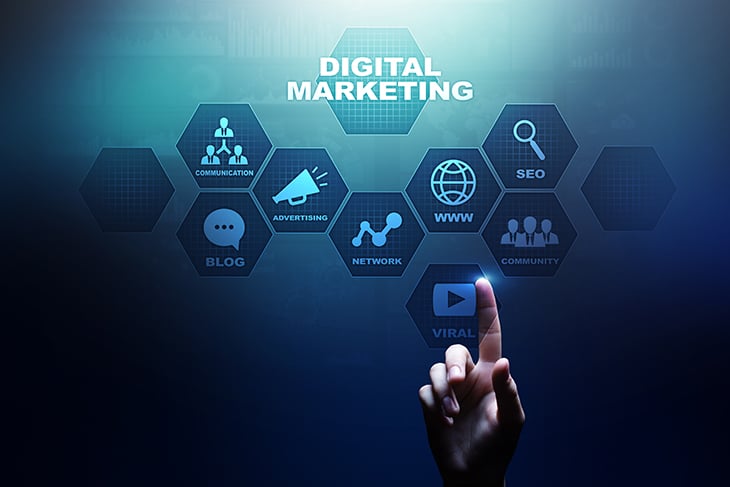Branding. People try to make it seem so complicated, but it really isn’t.
All it comes down to is a story and it’s something we all do—in our companies and in our personal lives. It’s the story we tell someone when we meet them, “Hi, my name is Kaleb and I’m a Creative Director at a branding agency.” It’s the “I’m Batman” moment.
What is brand identity? It’s simply the shorthand statement of who you are and what you can do for someone. When you find a way to sum up your company’s entire promise of what it will be like to work with you and what’s in it for them into a few short emotional words, you’ve found your brand.
Simple, right? So why is branding important, then? Why are we even talking about it, if it’s that basic?
Because, frankly, a lot of people have a hard time doing those two things. A lot of companies cannot succinctly and interestingly tell you what they do, who they do it for and why they do it. They just can’t. It’s as if this whirlpool of nuance and details begins swirling at their feet churning up mud until the waters are so dark nobody can see through them. And what happens when something is difficult?
People don’t do it. They give up.
However, even though branding seems simple and seems like something you can do later when you have the time for it, I want you to think hard about what you stand to gain by getting it right and doing it now. A branding machine that is true, defined and humming along will carry your business to that next level. It impacts so much more than just sales. A good brand will reshape how you, your employees, your customers and your investors think about your company.
A good brand communicates a clear story.
Companies with clear stories are valued higher by customers and investors. Companies with clear stories have employees who understand what they do and why they do it. Companies with clear stories are able to move people’s emotions, which is key to moving sales. People want to work for companies who do great things and great things are only great if they’re understood clearly and simply.
Put all that together and you have the potential to drive real money into your company. After all, as we’ve said before, nobody buys what they don’t understand.
3 Questions to Get Straight Before Branding Your Company
Okay, first thing’s first. If we’re going to talk about the importance of branding, we need to first make sure we know what it is and isn’t.
A company’s brand isn’t a logo.
Yes, that’s part of it, but think only of your logo as a signature, a shorthand mnemonic device, a symbol you burn into the hides of your customer’s hearts. (Don’t actually do that. You’ll go to jail. And, as we’ll see in a minute, that’s bad branding.)
The first and only golden rule about branding is this: it has to be authentic. You can’t sell lies. You can’t sell what you hope you can someday be. Sure, it works for a little while, but, if Elizabeth Holmes and Theranos has taught us anything, it’s that building a company on overpromising and under delivering, at best, makes for a terrible customer experience and, in extreme cases, leads to fraud investigations.So before you even begin defining or redefining your brand, make sure you know the answers to these three questions:
1. What is our company’s vision? Where are we going in the next 5, 10, 30 years?
Sometimes it feels like a company’s vision is a finish line that is always “just over that next hill.” We all know there is no finish line. Not in life and not in business. Yet, we all crave knowing where we’re going, what we’re reaching for. That’s vision. That’s the ever-elusive target that you want your entire team firing at and need to have in place before you can brand your business.
It’s hard to argue that there has been a more impactful business leader in the modern age than Steve Jobs. Someone who changed the very way we communicate with each other. But, how did he do it? How did he get 2,200,000,000 iPhones onto the planet?
By having a compelling vision.
2. What do we stand for? What are our values? Why do we do what we do?
There’s a reason “vision, mission and values” are often linked together like that—one leads to the other. While thinking through and articulating your vision, you’ll invariably begin to pull out ideas of why that vision matters. What kinds of values you’ll need to live by to achieve it. What kind of workplace and culture you want your people to operate in.
This “why” will become critical for your brand as we’ll discuss in a moment.
3. What do our customers say sets us apart?
If you want to tell a compelling story, first you have to know why you’re winning today (and probably why you aren’t, but that’s another article).
Talk to customers and learn what they think you are doing well and why they do business with you. If you can, speak with recent customers where the decision to buy is still fresh in their mind. However, don’t discount your gut and your internal team’s thoughts as well. Blend them together. Let one inform the other. Market research is key and can provide incredibly valuable data, but it does have its pitfalls as this video discusses.8 Reasons to Take Branding Your Business Seriously
Okay, on to the good stuff. Why branding is important and how to brand your business. Getting this straight will impact your company in 8 surprising—and some not so surprising—ways.
By knowing what your objectives are, what benefits you’re aiming for, you’ll make sure to consider all of these angles when you get into the work of rebranding a company or branding it in the first place.
1. Your brand represents your promise to your customers … and yourself
The very first reason branding is important, probably the most important reason, is that it very succinctly makes a promise to your customers.
A good brand will always tell customers what they should expect—and hold you to—when they work with you. And a great ancillary benefit of that promise is that it keeps you honest with yourself.
If you build a brand around being innovative, but then provide a me-too experience, the marketplace will tell you loud and clear in lost sales and declining revenue that you are not living up to your promise. The converse will also be true. If you deliver on that brand experience, you will reap the rewards.
Very, very often—more often than I can count—companies will tell us that their greatest source of new business is “word of mouth.” That’s the benefit of being aligned with your brand because what they’re really saying is this: we make a promise to our customers, those customers experience that promise and are fulfilled and have such a strong experience they share it with others.
Take Amazon for example. When it launched in 1995, it only sold books. Yet, from day one, founder Jeff Bezos knew he was going to build "an everything store.” Over the next several years, he worked tirelessly (and I mean tirelessly) to make that idea a reality. He then built a brand around it.
The idea that Amazon would make lives happier and easier by carrying anything and everything anyone could ever need became the rally cry for his team.
It even worked its way into their logo. Notice how the arrow sweeps from the letter “A” to the letter “Z” symbolizing offering everything from A to Z. And did you catch how the tip of the arrow forms the cheeks of a smiley face?
By defining their brand so crystal clearly, Bezos was able to keep his team focused on what matters. Making sure customers could always find what they need, quickly and cheaper than anyone else out there. They never compromised on that overwhelming goal and, through sheer willpower, hard work and business savvy have become one the most influential (for better or worse) companies on the planet.
Yes, Amazon’s logo is a strong brand identity mark. But it’s the promise behind it that made the difference.
2. Brand identity clarifies and forces focus
The second reason why it’s hard to overstate the importance of branding was already touched on above. Once you tell someone who you are, you’ve also implicitly told them who you aren’t. And, when it comes to positioning your company to win, that is often much more important.Brand identity becomes your purpose statement. Your positioning statement. Your north star. It becomes the thing you can always fall back on whenever a “great new opportunity” comes your way.
Does it align with who you are and what you promise your customers they can expect from you? Anything that doesn’t line up to a T with that can safely be ignored and discarded. It doesn’t matter how great it may sound. It’s not actually great if you can’t stay on target.
3. Move past mundane business transactions
When you engage with a company that is well branded, there is just a “feeling” that comes over you. Everything clicks.
- For consumer products it’ll be everything from the packaging to the checkout process to the in-store signage or online presence.
- For B2B customers, it’ll be the sales cycle, the sense of security that what you are buying is what you are getting, that this is a company that has your back, is partnering with you for mutual success and will not let you down.
Anything less than that, any experience built around simply swiping a card or signing a contract then never hearing from that company again except in getting the service or product … well, you might as well be a vending machine.
Can you remember any vending machines that you really loved and wanted to go out of your way to do business with again? Yeah, I didn’t think so.
Simply closing “transactions” is the death knell for a company. It’s a surefire way to make sure your future emails go unopened, that your future phone calls go unanswered and that your lame Christmas basket gets eaten, then discarded without anyone bothering to read the damn card.
When you have a brand that is memorable, a story that is easy to tell and retell to others, there’s no way for your service or product to disappear into Transaction Land. Instead, you’ll be “the guy.” When someone asks your current customers how they solved X, Y or Z problem, your customers will say, “I have a guy who…” And guess what? You’re “the guy.” (Or gal, or hero or whatever other word you want to put in there.)
A strong brand—a.k.a. a strong story—takes your company out of being a vending machine and into being a hero. That’s worth the effort.
4. A powerful brand strategy is built on emotions
You’re probably saying, “Okay, great, I believe you, Kaleb. But how do I create a strong story?” One word: emotions.
I don’t care what you sell or to whom. It can be the most complex financial derivative to hit the market in two decades, whose value can only be understood after a week’s worth of brain-melting math, if you want to sell it, you have to find the emotion in it.If you want to sell it, they have to feel it.
Modern behavior science has made it clear: we are emotional, instinctive creatures. We all want to be rational. We create pros-and-cons lists. We call referrals or talk to colleagues who have maybe used a service before, but at the end of the day, your decision, unconsciously, will come down to how you feel. An emotion you have around that decision.
The good news is, that’s not as hard as it sounds. Commodity consumer goods have had to find a way to do this for the history of commerce. And few today do it better than Nike.
Let’s say Kaleb wants a pair of shoes for working out. Shoes are a commodity. There are hundreds of companies that make them and they are all, for the most part, entirely similar. They’re cheap, easy to make and don’t especially matter all that much to me from a performance standpoint. I’m a weekend warrior. A guy who rolls into the gym a couple times a week and then rolls out and probably downs half a pizza and an IPA on the weekend. Yet, I promise you, I will buy only one brand of shoes even though I know I am paying more for that stupid swoosh. And it’s all because of this single ad:
If you didn’t get chills when he said, “Every. Single. Day of my life,” I’m not sure you’re human.
A brand built around tripping your customer’s emotions will always crush competitors who are talking about features and benefits.
5. A well-defined brand will guide advertising and marketing
Because we already started talking about it, let’s move on to how a strong brand can make your advertising more efficient.
Once you know what kind of company you are or are not going to be, have that story in place and targeted what emotions your customers should feel when working with you, it’s only natural, then, that your marketing and advertising efforts will tighten up dramatically.
One of the first steps in our branding process is a communications audit. It’s generally unpleasant (though never surprising to either the client or us) because often what we identify is that the client’s past work has been scattered at best and self-destructive at worst.
Without a strong, clearly defined brand, it’s impossible to know what to say to customers or how to say it. What happens, then, is the shotgun approach. Blast out everything (sometimes into the same ad) and see what sticks. The problem, of course, is that marketing isn’t free. No matter how grassroots your company tries to be, marketing done well and done strategically will always require an investment. And money is the least important resource lost.
Time and missed opportunities are hands-down the greater damage. Often, by the time companies come to us, they’ve wasted years and tens of thousands, sometimes hundreds of thousands of dollars on advertising with no clear brand strategy or emotional trigger, with few new customers to show for it.
Money is the least important resource lost. Time and missed opportunities are hands-down the greater damage.
Good lord, it hurt just writing that paragraph. It breaks my heart because it’s so unnecessary. I’m begging you. Get your brand straight. Put in the effort to really understand your customers and their emotions, and then use that to guide every single marketing touch point from there on. The return on investment will show itself sooner than later. Stop the bleeding.
6. A strong brand engages and aligns employees
Speaking of bleeding, stop losing talented employees!
Now, don’t get me wrong. I’m not going to sit here and tell you that a strong brand will fix all your personnel issues. It’s not a panacea. You still have real-life challenges like pay and benefits and work-life balance and career advancement opportunities and everything else that goes into attracting and keeping talent.
However, at Imaginasium our magic sauce is that we approach every project from a single goal—align everything around the customer. It’s what we call the Customer Experience Ecosystem. When you have a well-defined brand and a clear internal communication strategy, people feel better about working for you. And when they feel better about working for you, they stay longer, move and think a little bit faster and don’t get distracted by nonsense as easily.Look, employees are no different than customers.
They want a story. They want to know what they do and why they do it. They want to know what’s expected of them by both customers and their leadership. And, most importantly, they want to feel good about the company they give so much of their life to. You have a responsibility to help them tell that story. It’s the story they tell their spouses, their children and parents and neighbors. Make sure they are all telling the same version of that story and that they feel excited about it.
7. A compelling brand attracts top talent
Closely connected, yet different, is the flip side of engaging current employees … attracting new talent. There are companies who come to us saying they will post open jobs and receive zero—ZERO—applicants. Today’s job market is so competitive, the labor pool so tapped out, that companies are taking orders for which they have absolutely no people in-house to fill. That leads to those who do work there having to pick up extra shifts, work mandatory overtime and just generally burn out that much faster.
Yet, there are companies, even in today’s labor force, who have no problems whatsoever filling open positions. Every market and industry has them. They’re the “sexy” companies where people want to work because it’s the big player in a given space or they offer insane benefits or, most often, are doing “the coolest work.”
But what does that mean?
All it means is they’ve found a way to tell a really exciting story about the kind of work they do. It’s why Forbes numbers it as its top smart hiring strategy—offering clarity and conviction. No, I don’t mean about what their actions at work are. I mean the impact their work has on other people’s lives.People are attracted to companies that are good, do good work and win. Everyone wants to join a winning team. A strong brand will naturally position you as a winning company doing great things. And that means when a candidate has to choose whom to give her life to, she’ll likely pick you.
8. A strong brand builds financial value into your company
At the end of the day, all this branding stuff really just comes down to this. Financial value.
- Sales.
- Growth.
- Breaking into new markets or creating new markets from scratch.
All of it happens when a company—whether new or established—has a powerful brand story. They know who they are, what they do, what customers get from working with them and what kind of satisfaction employees get from working for them. That story drives everything from sales to investments.
It’s the Shark Tank show in a nutshell. It’s the proverbial Elevator Pitch. People invest in, do business with—a.k.a give money to—companies they understand and believe in.
If reasons one through seven weren’t strong enough, this one has to be.
1 Reason Your Brand Isn’t Important
We’ve spent a lot of time talking about why branding is important and answering the question: what is brand strategy, but we can’t stop there because there’s one very important reason why branding isn’t important.
A promise is only good if it’s kept.
A promise is only as good as the actions that support it. If you don’t operationalize how you’ll live your brand and make it real, all the pretty words and pictures won’t make a difference.
Remember way back at the beginning when we talked about how important being authentic is? This is it. This is where you make sure that happens. Only put into your brand definition those things you know you will achieve with each and every client at all touchpoints throughout the organization.
Anything less, and you’ll not only not achieve any of the eight benefits listed above, you’ll likely actually damage your company instead. Don’t do that.
How to Brand Your Business Is the Second Most Important Decision You’ll Make...
… right after deciding to even start the business in the first place. It will guide everything you do from that moment forward, from…
- what markets to enter
- whom to serve
- what kind of employee to hire
- how to engage your customers
- and what you hope they feel and experience by working with you
Defining a brand isn’t rocket science, but it does require human insight and keen storytelling skills. And, if you’re going to do it right, you want to make sure you are considering all facets of your organization throughout the entire process. Failing to consider how any one aspect of your organization—from leadership and vision-setting to internal communications and human resources to marketing, sales, digital touchpoints—if even one of those is left out of the equation, your brand and customer experience will be put at risk.
If that sounds like something you want help with, that’s what we at Imaginasium do. We’ve spent decades helping companies of all kinds, with a special focus on manufacturers (who often have unique and complex business challenges to unpack), define who they are, where they’re going and why their employees and customers should be excited about it.We drive growth for companies by simplifying their complex messages, then communicating them clearly.
We encourage you to take some time and look at our work, read our thinking or watch one of our speaking engagements to see how we approach this kind of work.
Then, give us a call. It’ll be worth the conversation. Guaranteed.









